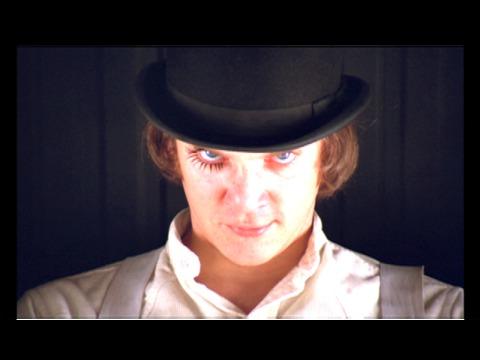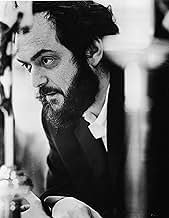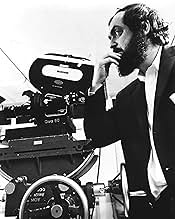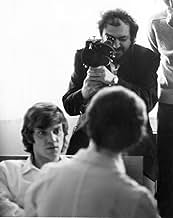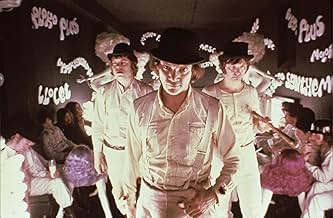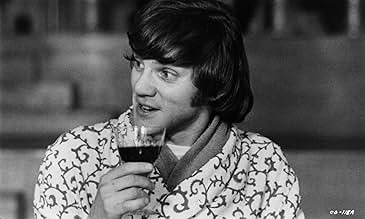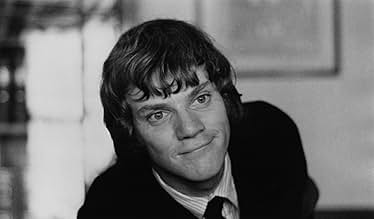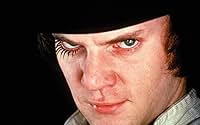Im Großbritannien der Zukunft sitzt der charismatische Delinquent Alex DeLarge im Gefängnis. Er meldet sich freiwillig für eine experimentelle Aversionstherapie, die von der Regierung zur Lö... Alles lesenIm Großbritannien der Zukunft sitzt der charismatische Delinquent Alex DeLarge im Gefängnis. Er meldet sich freiwillig für eine experimentelle Aversionstherapie, die von der Regierung zur Lösung des Kriminalitätsproblems entwickelt wurde - aber es läuft nicht alles nach Plan.Im Großbritannien der Zukunft sitzt der charismatische Delinquent Alex DeLarge im Gefängnis. Er meldet sich freiwillig für eine experimentelle Aversionstherapie, die von der Regierung zur Lösung des Kriminalitätsproblems entwickelt wurde - aber es läuft nicht alles nach Plan.
- Regie
- Drehbuch
- Hauptbesetzung
- Für 4 Oscars nominiert
- 12 Gewinne & 26 Nominierungen insgesamt
Zusammenfassung
Empfohlene Bewertungen
The director wants the audience to feel something as bad not because he is showing it as bad but because it really is bad. The background music accompanying the ultra violent scenes is comical, and not dramatic or anything else that is commonly associated with such scenes. This gives the viewer an opportunity to feel the bitterness not because the music hints so but because he himself feels so. Viewer's emotions should arise irrespective of what the director is trying to show, and this is one of the greatest successes of the movie.
Another glorifying feature is the central idea of the movie. If a human is striped of the choice to choose from good and evil, he no longer remains a human, he becomes a clockwork. When Alex is brain-washed and "programmed" to choose only good, he wasn't accepted by the society and this shows the irony in the objectives of the British Government. The word Orange from the title presumably comes from the word "Ourange" that loosely means man. And hence the title is so appropriate to the movie.
The artificiality in dialogues and sets give the movie a unique feature and enhance the grip on it. This also means that the viewer has to get more involved. This is definitely one of the best technically shot movies, another masterpiece of Kubrick like the Space Oddessey.
For the uninitiated, set in near future Britain, the movie shows Malcom MacDowell as the head of a group of youngsters involved in sexual violence. Turn of the events leave the protagonist in the hands of the police. Worried by the growing number of prisoners the British Government devises a method of "programming" them so that they always choose the good. Alex is chosen as one of those on which the new system is to be tested. The rest unfolds as a saga of the very human characteristic.
Lastly, I would like to say that you may be compelled to leave the movie in between, but if you are watching it for art and cinematic experience, I recommend you to sit through.
The film became infamous for its depiction of violence and sex. It overlooked the fact that despite its initial scenes of brutality and rape, in its heart it is a dark comedy set in a futuristic Dystopian Britain.
An adaptation of Anthony Burgess novel, Malcolm McDowell might be a shade too old to play the teenage delinquent Alex getting high on milk-plus which is infused with drugs and then partakes in an orgy of ultra-violence which includes beating up a vagrant, fighting with a rival gang and then speeding through the country roads where they burst into the house of a writer who gets beaten up and watches his wife get raped as Alex sings Singin in the rain.
We know Alex is still at school as he lives in his parents flat and is visited the next morning by his probation officer who is concerned about his absence from school.
However Alex's luck runs out. He falls out with his fellow gang members and when he breaks into another house, he kills a woman with a phallic sculpture, betrayed by his gang and caught by the police, he is sentenced to 14 years in jail.
The opening part of the film would had been deemed shocking in early 1970s Britain. I doubt that level of sex and savagery would had ever been seen before in a mainstream British film.
However the film becomes more of a surreal prison film once Alex ends up in jail where he joins a church group and tries to fend off advances from fellow inmates. A visiting government minister offers him a chance to take part in an experiment. Once he undertakes an experimental aversion therapy for rehabilitating criminals within two weeks the film becomes a black revenge comedy.
Once freed from prison and rehabilitated Alex finds there is no room for him in his parents home, he gets set upon by a gang of vagrants as the tramp who he beat up in the beginning recognises Alex. His old gang members are now in the police and they torture him. Worse still he stumbles into the house of the writer who he attacked and he gets his vengeance as well. Poor Alex now cannot listen to his favourite piece of Beethoven without doing harm to himself.
There is an underlying political satire of a government wanting to tackle violence in society by being draconian themselves until public opinion turns against them.
The film contains a lot of slang derived from east European languages and although I mentioned he looked rather old to play the teenage Alex, Malcolm McDowell delivers an amazing performance providing a narrative with his Yorkshire tones.
The film might put off some of its audience with its disturbing opening but settles in well after that.
The film grabs you and glues you to your seat from start to finish. Malcolm McDowell gives us a shining example of superior acting, and the movie is as perverted as any of Kubrick's masterpieces (and then some!). It contains horrifying violence, extreme emotions, perversity and weirdness at it's very worst. It all boils down to serve you a plethora of thoughts for you to take with you and contemplate, after the film ends.
However, with all the perversity bursting out of this film, you will probably NOT like this film the first time you see it. I know I didn't. Fortunately, I gave it a second chance, and thought: Hey, it was actually not bad at all. After the third time, I was lost for words.
After the fourth time, there was little doubt in my mind, that this was the finest film ever made, and regardless of how many great masterpieces I see, A Clockwork Orange still towers above them. I'm sure you'll agree, if you give it the chance it deserves, although it may require for you to see it more than once.
Director's Trademarks: A Guide to Stanley Kubrick's Films
Director's Trademarks: A Guide to Stanley Kubrick's Films
Wusstest du schon
- WissenswertesMalcolm McDowell's eyes were anesthetized for the torture scenes so that he would film for periods of time without too much discomfort. Nevertheless his corneas got repeatedly scratched by the metal lid locks.
- PatzerMany of the continuity errors are not in fact errors. Stanley Kubrick purposely included many continuity errors as a way of creating a feeling of disorientation for the audience. That is why people's positions change, props are reorganized, and hats (and other articles of clothing) appear and disappear.
- Crazy CreditsThere are no opening credits after the title, which is followed by the opening shot of Alex the Droog. Although it is now commonplace for major films to not have opening credits, in 1971 it was considered rather unusual and was considered a trademark of director Stanley Kubrick.
- Alternative VersionenIn 1973, a new version of "A Clockwork Orange" was released to theaters with an MPAA rating of "R", replacing the previous "X". The new version contained approximately 31 seconds of replacement, less lascivious footage for two scenes: the high speed (2 fps) orgy in Alex's bedroom, and the Ludovico rape scene. The bedroom scene was made more comical by having one of the girls fall off the bed and Alex joins her down there. The Ludovico rape scene was altered in that the scenes with the first two droogs was from the side and waist-up, so it is less explicit. The third droog was removed completely and replaced with a close-up of one of the doctor's face as they are watching Alex's treatment.
- VerbindungenEdited from Triumph des Willens (1935)
- SoundtracksSymphony No.9 in D Minor, Opus 125 Choral: II. Scherzo. Molto vivace
Written by Ludwig van Beethoven
Recorded by Deutsche Grammophon Gesellschaft
Top-Auswahl
Details
- Erscheinungsdatum
- Herkunftsländer
- Sprache
- Auch bekannt als
- Clockwork Orange
- Drehorte
- Binsey Walk, Southmere Lake, Thamesmead South, London, England, Vereinigtes Königreich(Alex puts Dim in water - houses demolished)
- Produktionsfirmen
- Weitere beteiligte Unternehmen bei IMDbPro anzeigen
Box Office
- Budget
- 2.200.000 $ (geschätzt)
- Bruttoertrag in den USA und Kanada
- 26.617.553 $
- Weltweiter Bruttoertrag
- 27.035.204 $
- Laufzeit
- 2 Std. 16 Min.(136 min)
- Farbe
- Sound-Mix
- Seitenverhältnis
- 1.66 : 1

